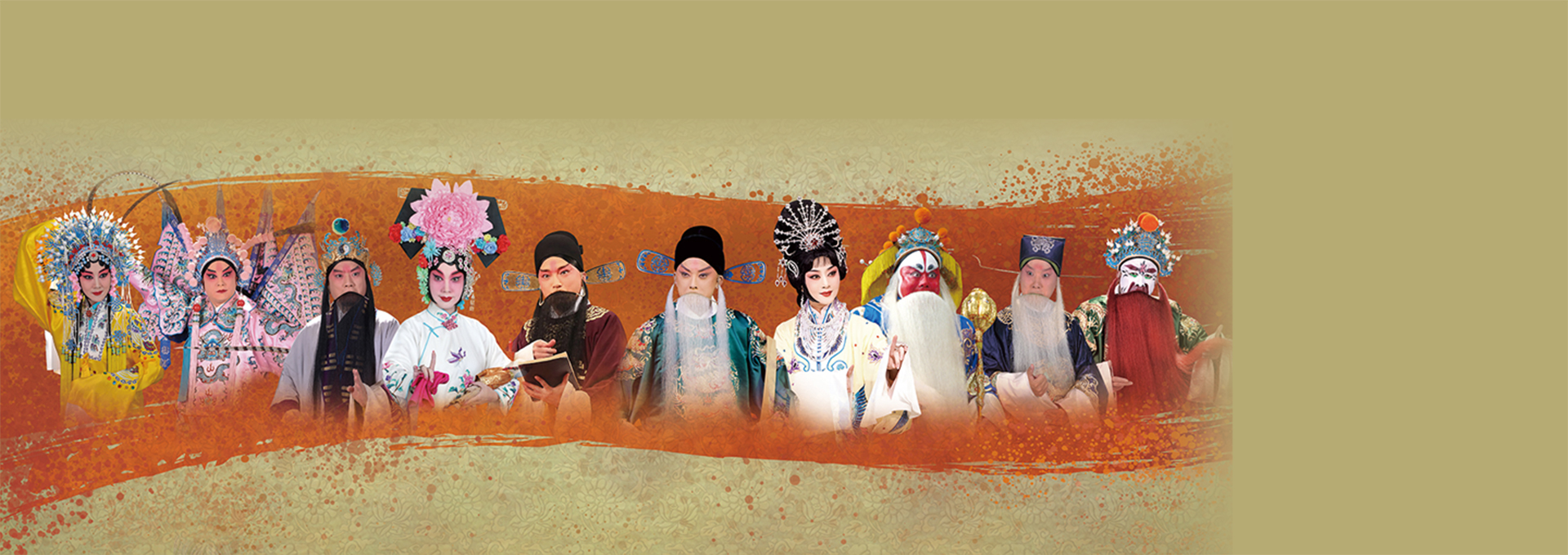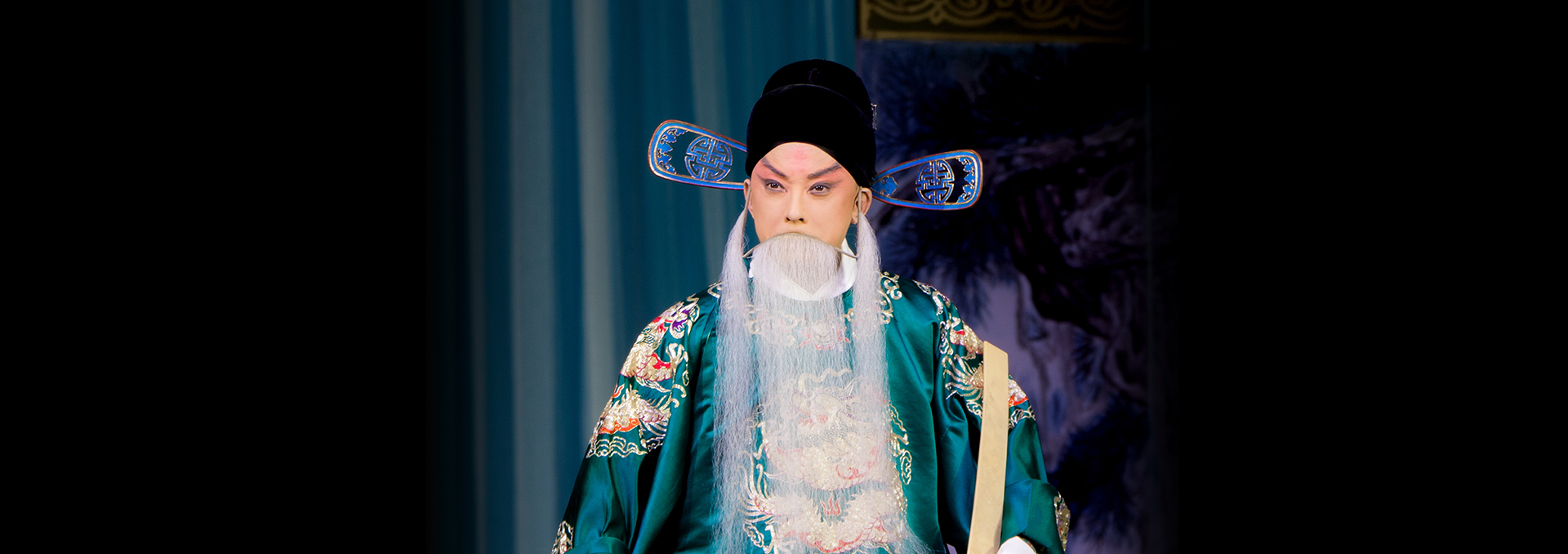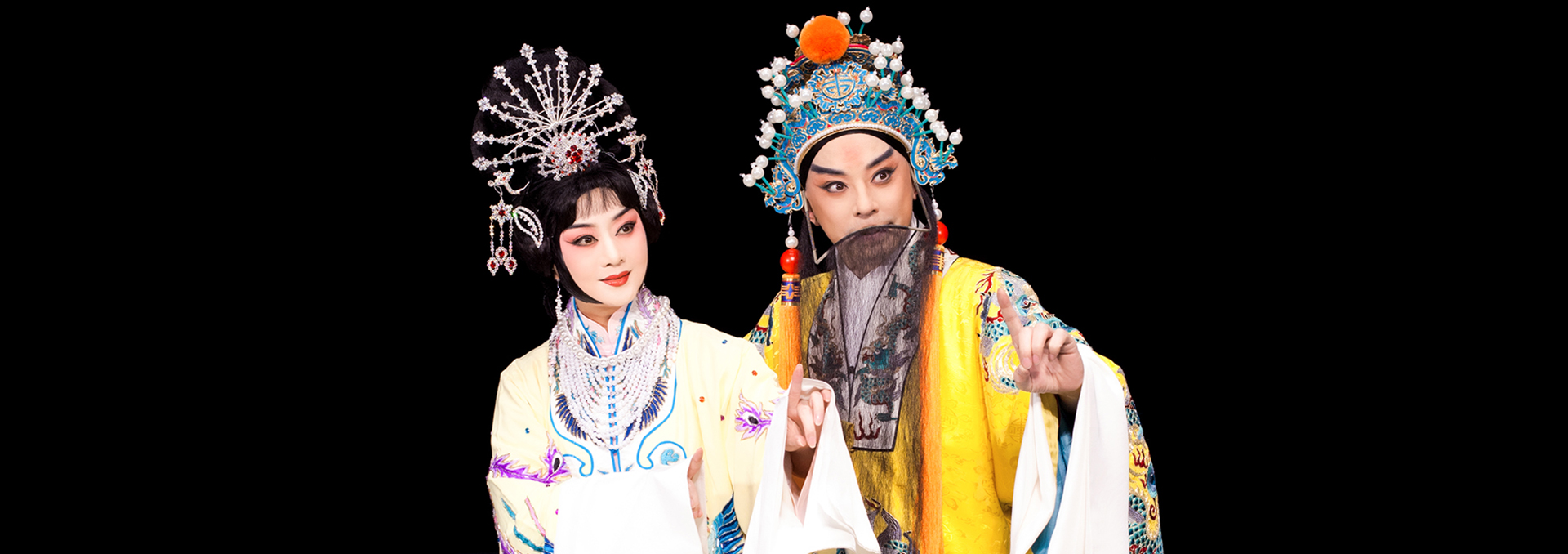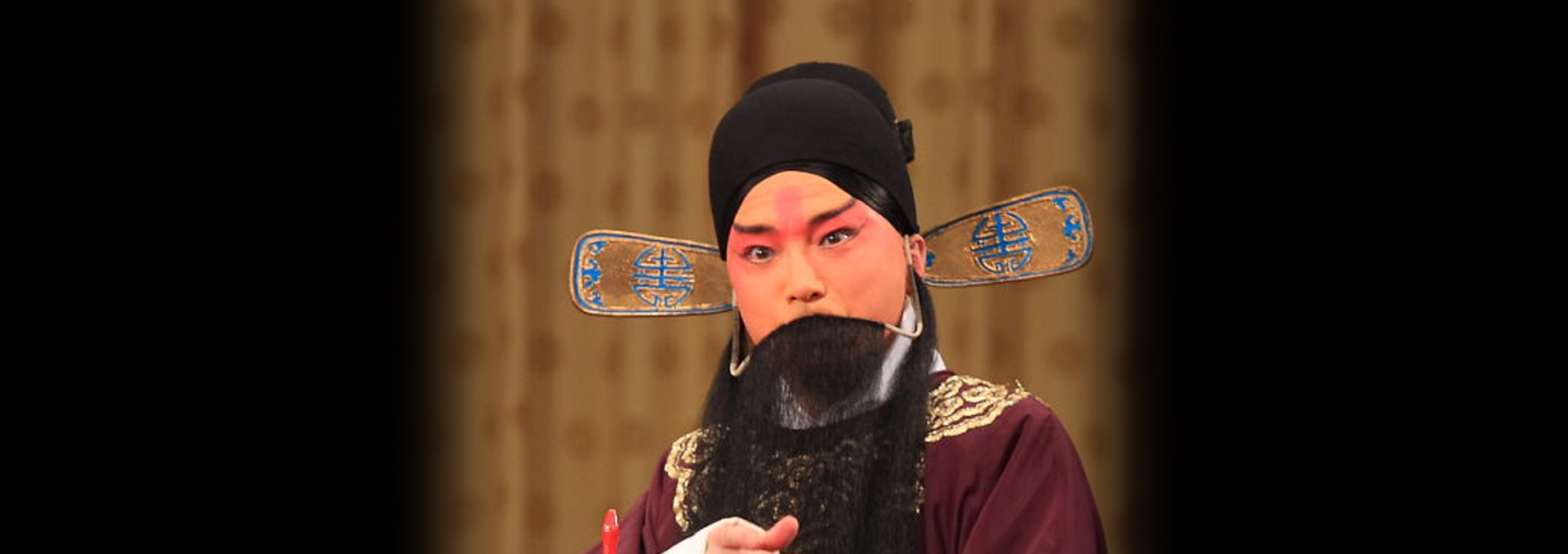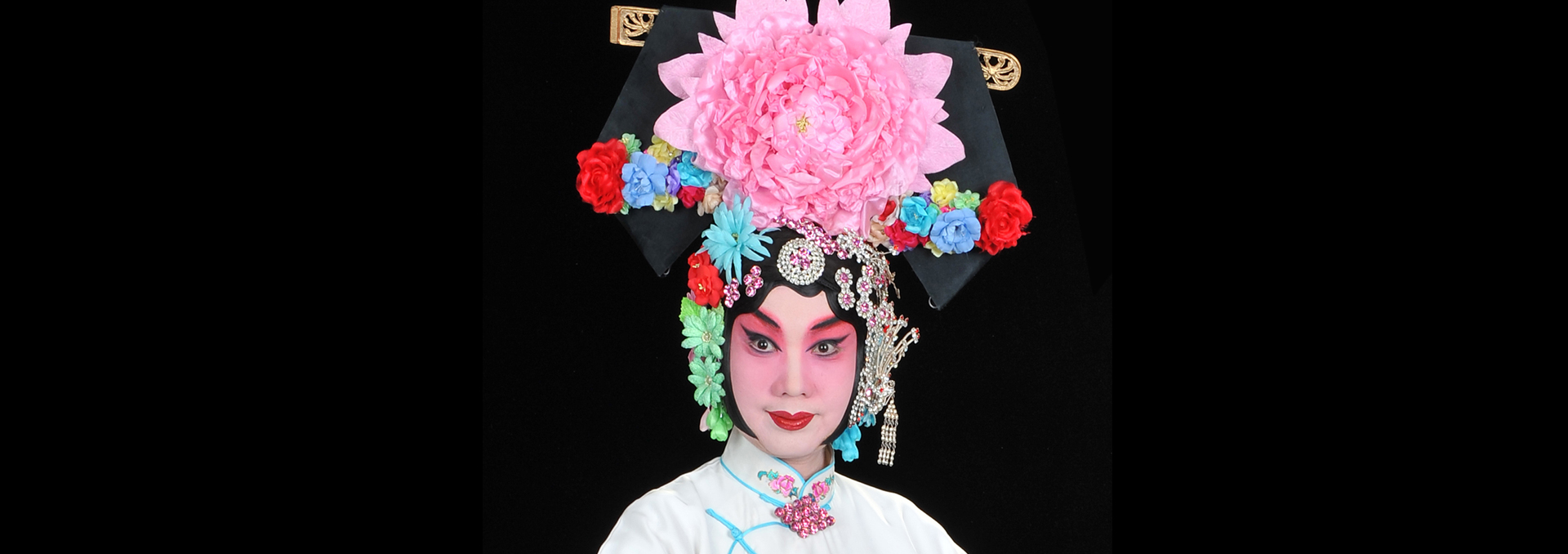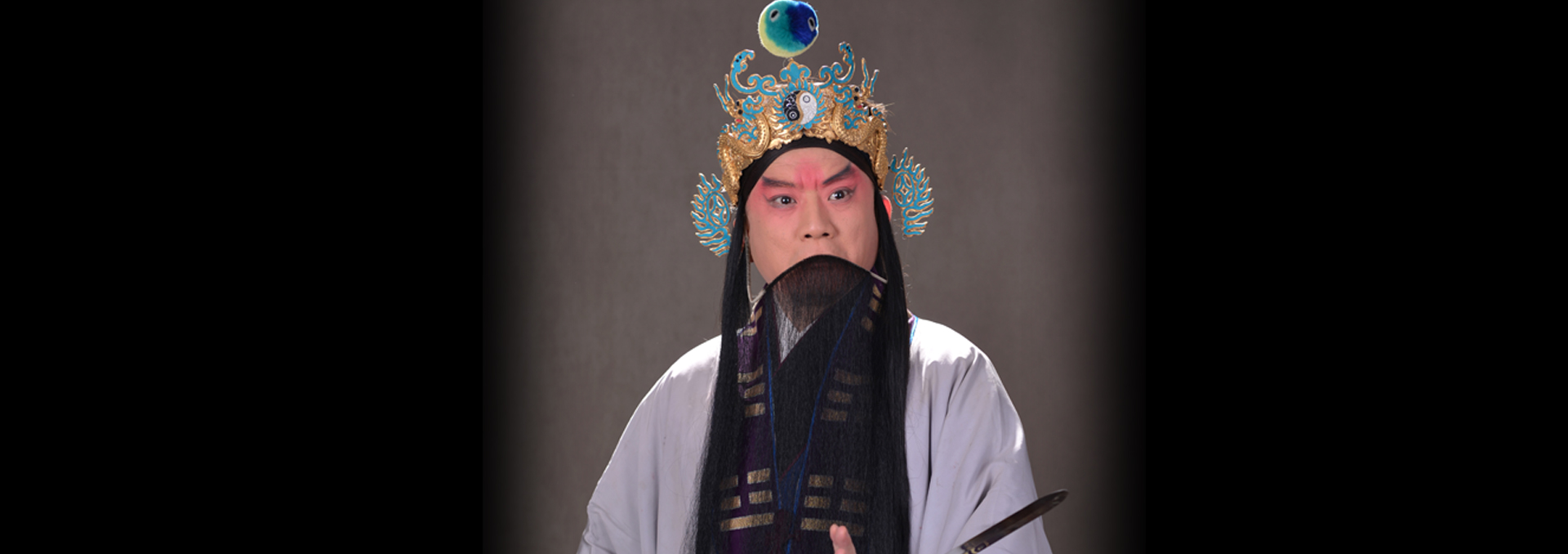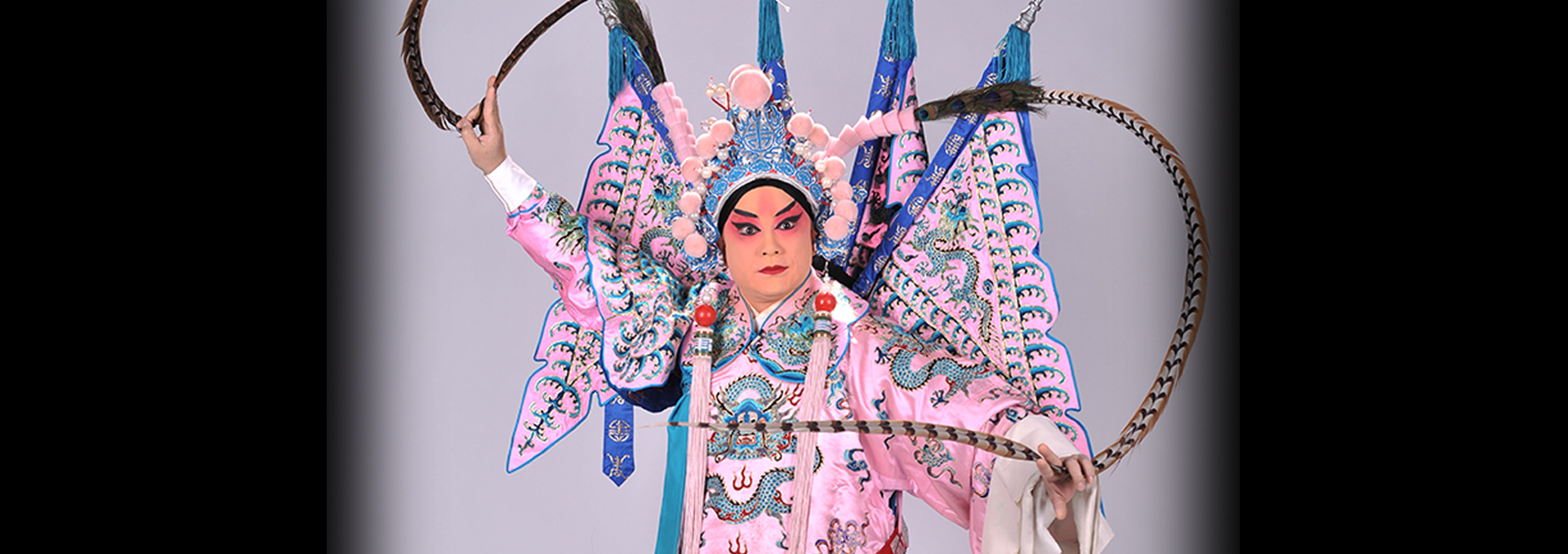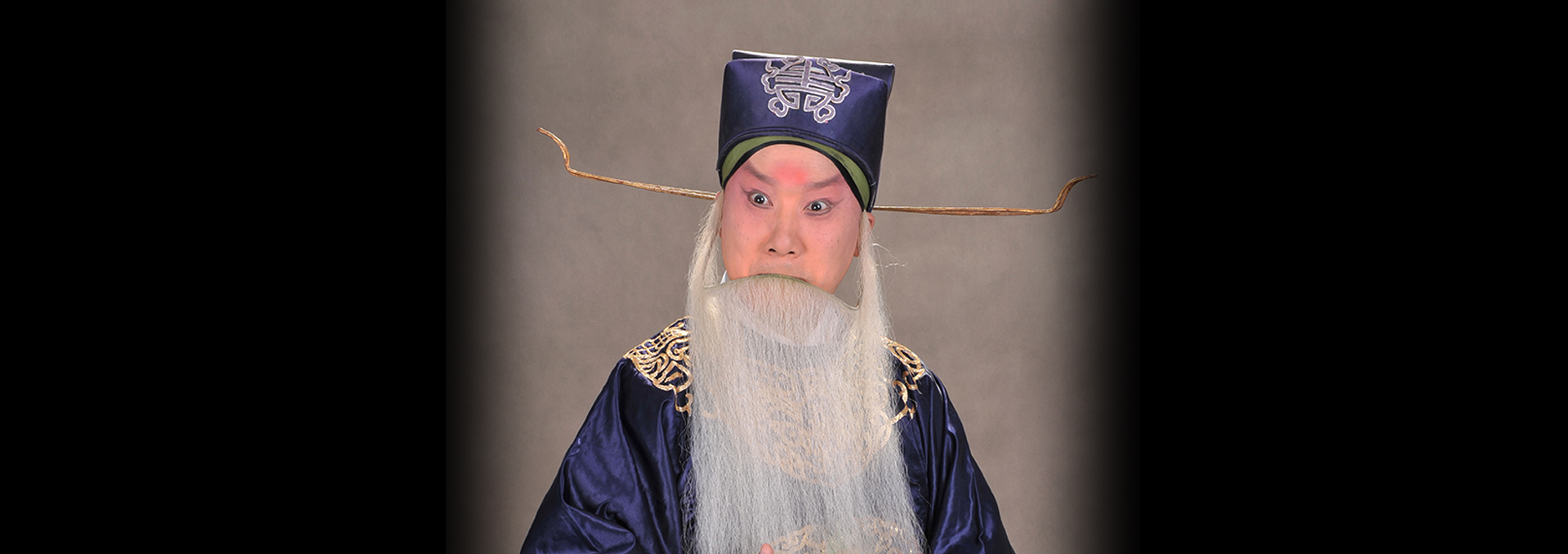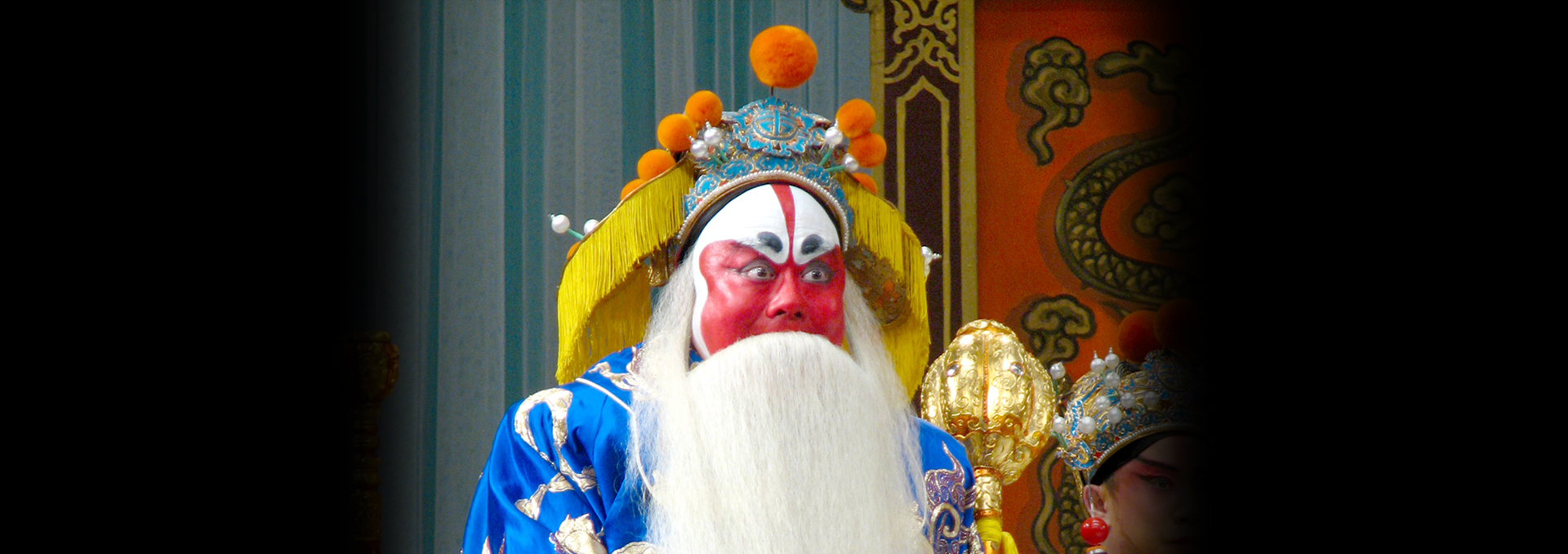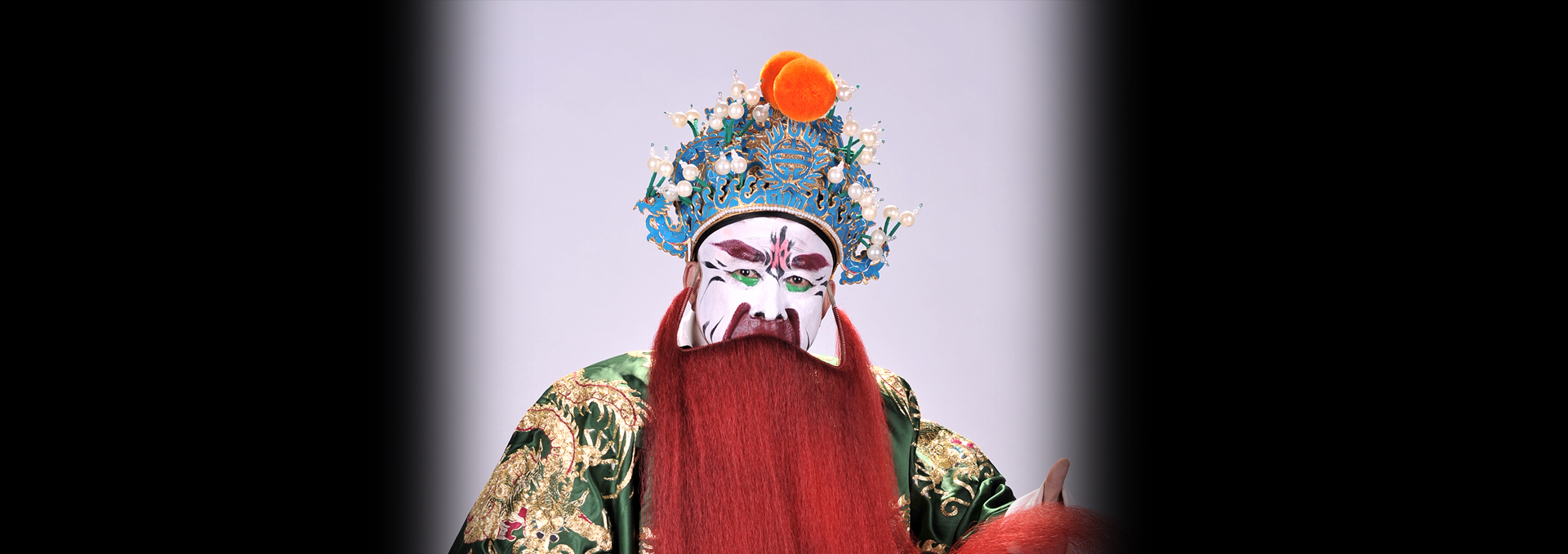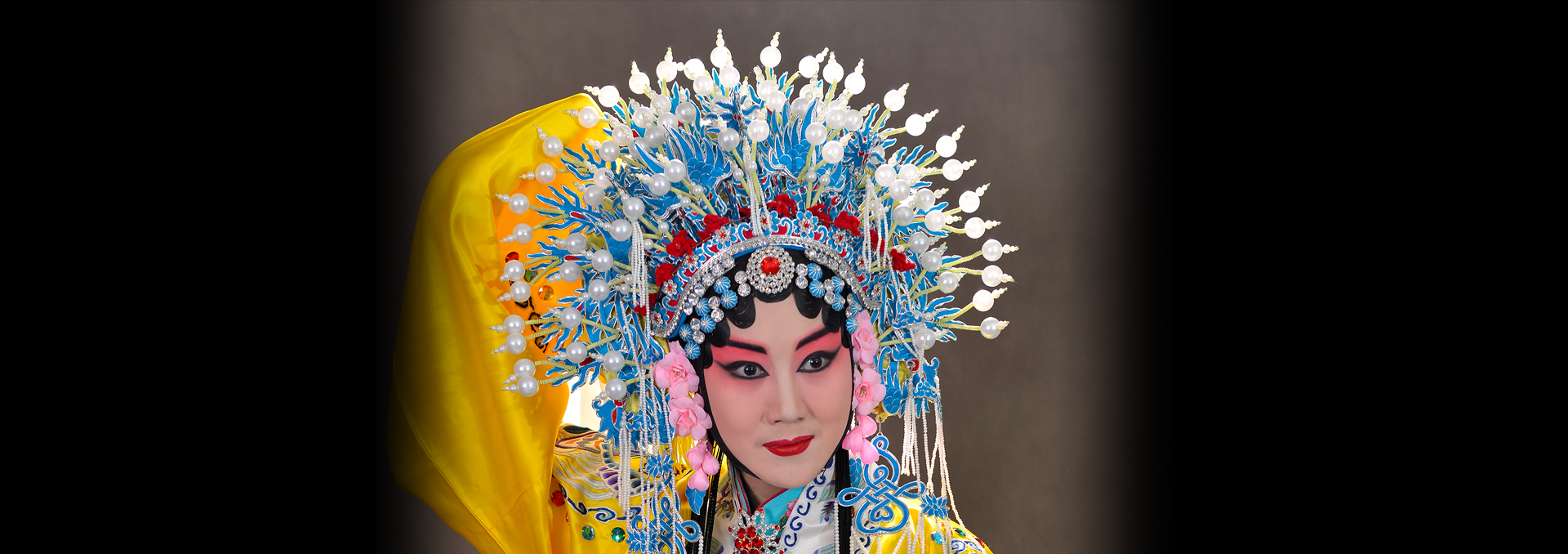
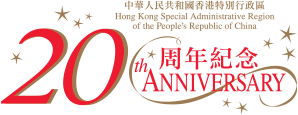
Opening Programme
Peking Opera Gala:
Peking Opera Theatre of Beijing and First Troupe of the China National Peking Opera Company
Introduction
Two top-notch Peking Opera troupes are visiting Hong Kong to showcase their distinguished talents to kick off the Chinese Opera Festival. The first three performances will be headed by the Peking Opera Theatre of Beijing. The opening performance A Right Royal Match is a lively and entertaining traditional Peking Opera. Esteemed performing artists Yu Kuizhi, Du Zhenjie and Yang Shaopeng will be co-playing Liu Bei; Li Shengsu and Zhang Huifang will be co-playing Sun Shangxiang. Also in the cast is the representative xiaosheng (young male) actor Li Hongtu and other renowned artists. A Meeting of Heroes, Invoking the East Wind and The Huarong Pass is another classic that features reverberating singing. The cast comprises of Tan Xiaozeng (celebrated laosheng (old male) of the Tan (Xinpei) school), Zhu Qiang (laosheng of the Ma (Lianliang) school), Du Zhenjie (laosheng of the Yang (Baosen) school), as well as guest performer Yang Chi (direct apprentice of Yuan Shihai). The Fourth Son Visits his Mother is a representative work of Wang Rongrong, renowned leading qingyi (virtuous female) of the Zhang (Junqiu) school. She will be partnering with laosheng actors Zhang Jianfeng, Tan Zhengyan, Yang Shaopeng and Zhu Qiang, who will be co-performing the role of Yang Yanhui. The First Troupe of the China National Peking Opera Company will take the lead in the next three performances. Yu Kuizhi, a leading artist playing the laosheng role, will be headlining in Pillars of the Dynasty, Visiting the Mausoleum and The Two Faithful Courtiers; he will be co-starring with Li Shengsu, a dan (female) performer who has inherited the art of Mei Lanfang, and Yang Chi. The production is characterized by demanding singing segments that bring out the rapport and virtuosity of the cast. The Nymph of Luo River and The Unofficial Biography of Taizhen are both famous Mei (Lanfang) school repertoires. The Loss of Jieting, Empty City Stratagem, Executing Ma Su, on the other hand, is a representative Peking Opera title that underscores the art of laosheng.

Opening Programme
Peking Opera Gala:
Peking Opera Theatre of Beijing and First Troupe of the China National Peking Opera Company
Programme Details
Grand Theatre, Hong Kong Cultural Centre
13/6 Tue 7:30pm
A Right Royal Match
A Right Royal Match is an opera that features all four main role types in Chinese opera: sheng (male), dan (female), jing (painted-face) and chou (comic). Being an ensemble cast opera, it gives equal importance to its major characters, thusenabling top artists of each role type to showcase their prowess in their performance. It is a popular piece performed inauspicious occasions and grand celebrations. Based on the story told in Chapters 54 and 55 of the famous historical novel Romance of the Three Kingdoms, the opera recounts the marriage of Liu Bei to Sun Shangxiang, the younger sister of hisrival Sun Quan. Ganlu Temple and Nuptial Night are two excerpts in the opera often individually performed. Peking Operavirtuoso Mei Lanfang once said that whenever there were charitable performances for three days at Diyi Theatre inBeijing, A Right Royal Match would often be staged. That means it was one of the traditional repertoires for collaborative performance by top artists from different troupes.
Liu Bei is occupying Jingzhou and is not keen on returning the city. Sun Quan therefore sets up a honey trap with Zhou Yu, making up the story that his younger sister Shangxiang is to marry Liu Bei – the idea is to deceive Liu Bei to cross the river and become hostage so that Sun Quan can take back Jingzhou. The trap is seen through by Zhuge Liang, who suggests that Liu Bei is to ride on Zhou Yu’s father-in-law Qiao Xuan to please Madam Wu, the mother of Sun Quan. Madam Wu discusses her daughter’s marriage at Ganlu Temple; the sham turns into reality. After Liu Bei becomes the princess’ husband of Eastern Wu, Zhou Yu tempts him with the pleasures of the palace. Liu Bei has no intention to return Jingzhou then. Zhao Yun uses the scheme crafted by Zhuge Liang and forges a story that Cao Cao is to attack and seize Jingzhou. At the request of Liu Bei, Shangxiang bids farewell to her mother and returns to the home state of Liu Bei. Zhou Yu sends a troop to intercept, but all soldiers are blamed and sent back by Shangxiang. When Zhou Yu and his troop catches up, Zhuge Liang has already prepared a getaway boat to get Liu Bei out of danger.
Scene One Crossing the River
Scene Two Visiting Qiao Xuan
Scene Three Going to the Palace
Scene Four Presenting a Plot
Scene Five Ganlu Temple
Scene Six Nuptial Night
-Intermission of 15 minutes -
Scene Seven Barging into the Palace
Scene Eight Bidding Farewell
Scene Nine Barging into the Army Camp
Scene Ten Dashing Carriage
Scene Eleven Lake Luhua
Scene Twelve Returning to Jingzhou
Cast (in order of appearance)
Zhao Yun: Tan Zhengyan
Liu Bei: Yang Shaopeng
Lu Fan: Ni Shengchun
Jia Hua: Sun Shimin
Qiao Xuan: Zhu Qiang
Qiao Fu: Huang Baixue
Madam Wu: Kang Jing
Sun Quan: Chen Junjie
Sun Shangxiang: Li Shengsu
Liu Bei: Yu Kuizhi
Liu Bei: Du Zhenjie
Sun Shangxiang: Zhang Huifang
Zhou Yu: Li Hongtu
Lu Su: Zhu Qiang
Zhang Fei: Yang Chi
Zhuge Liang: Yu Xinze
Drum: Liu Yang, Zhao Qi, Feng Qian, Yang Guangtong
Qin: Ai Bing, Wei Wei, Zhao Xu, Zuo Xu
The running time of the performance is approximately 3 hours including an intermission of 15 minutes.
Grand Theatre, Hong Kong Cultural Centre
14/6 Wed 7:30pm
A Meeting of Heroes, Invoking the East Wind and The Huarong Pass
This is a well-known traditional opera that has enjoyed longstanding popularity. Adapted from stories in Romance of the Three Kingdoms, it focuses on the intense battle of wits among three rivalry leaders. The characters’ personality clash is vividly depicted to expose the fierce power and military struggles in ancient politics. As the opera has been put on stage for generations, it has been refined and polished by artists of different time; its plot is full of colour, its structure is wellknit. This is an ensemble cast opera that emphasizes on the performers’ skills in singing, recitation, acting and fighting. Its beautiful arias are widely known.
The armies of Sun Quan and Cao Cao are at a stalemate on both sides of Yangtze River. Cao Cao deploys his advisor Jiang Gan to cross the river and convince Zhou Yu to surrender. Zhou Yu puts up a meeting of heroes and shows off the prowess of his army to Jiang Gan. Zhou Yu also uses a counter-espionage strategy which makes Jiang Gan steal a forfeited surrender letter to eliminate the leaders of the Cao navy Cai Mao and Zhang Yun through the hands of Cao Cao. With Liu Bei’s command, Zhuge Liang goes to Zhou Yu’s tent to give advices as a military counsellor. Zhou Yu attempts to set up traps but fails after a few trials. Zhou Yu is furious with Zhuge Liang for borrowing arrows with thatched boats and seeing through his ruse. By praying to borrow the east wind, Zhuge Liang defeats Cao Cao at the Red Cliffs. Cao Cao leads his last eighteen chivalries and escapes to Huarong Pass, meeting Guan Yu along the way. He begs to Guan Yu and tries to move him by reminding him of past favours. Guan Yu is moved and releases Cao Cao.
Scene One A Meeting of Heroes
Scene Two Jiang Gan Stealing the Letter
Scene Three A Counter-espionage Strategy
Scene Four Matching the Word "Fire"
Scene Five Borrowing Arrows with Thatched Boats
Scene Six Self-torture Ruse
-Intermission of 15 minutes -
Scene Seven Invoking the East Wind
Scene Eight Battle Boats in Flame
Scene Nine The Huarong Pass
Cast (in order of appearance)
Huang Gai: Chen Junjie
Zhou Yu: Li Hongtu
Lu Su: Tan Xiaozeng
Zhuge Liang: Du Zhenjie
Jiang Gan: Huang Baixue
Cao Cao: Yang Chi
Kan Ze: Ni Shengchun
Zhao Yun: Tan Zhengyan
Guan Yu: Zhu Qiang
Drum: Liu Yang, Feng Qian
Qin: Ai Bing, Zhao Xu
The running time of the performance is approximately 3 hours and 15 minutes including an intermission of 15 minutes.
Grand Theatre, Hong Kong Cultural Centre
15/6 Thu 7:30pm
The Fourth Son Visits his Mother
An opera based on Generals of the Yang Family. With the exception of hualian (painted-face), it features the role types of laosheng (old male), qingyi (virtuous female), huadan (young female), xiaosheng (young male) and laodan (old female). All of its singing is in xipi tune, which evokes a strong artistic appeal on the audience. Remembering his Mother at the Palace is an excerpt of the opera often performed on its own.
During the war between Liao and Song, Song commander Yang Yanhui is captured by the enemy; he changes his name to Mu Yi and marries Princess Tie Jing of the Liao state. Fifteen years later, Madam She, the mother of Yanhui, leads a troop and arrives at Yanmen Gate. Princess Tie Jing gets a clearance arrow by trick and passes it to Yanhui, so that he can secretly go to the Song camp to visit his mother. He rushes back to Liao at midnight but is arrested by the Empress Dowager Xiao of Liao and sentenced for execution. He is only pardoned after Princess Tie Jing and others begged for him.
Scene One Remembering his Mother at the Palace
Scene Two Stealing the Clearance Arrow
Scene Three Crossing the Pass
Scene Four Patrolling the Camp
-Intermission of 15 minutes -
Scene Five Meeting his Brother
Scene Six Meeting his Mother
Scene Seven Meeting his Wife
Scene Eight Bidding Farewell
Scene Nine Returning to the Palace
Cast (in order of appearance)
Yang Yanhui: Zhang Jianfeng
Princess Tie Jing: Wang Rongrong
Empress Dowager Xiao: Wang Yi
Yang Yanhui: Tan Zhengyan
First Royal Uncle: Zhao Shikang
Second Royal Uncle: Sun Shimin
Yang Zongbao: Li Hongtu
Yang Yanzhao: Ni Shengchun
Yang Yanhui: Yang Shaopeng
Madam She: Kang Jing
Meng Jinbang: Zhang Xi
Yang Yanhui: Zhu Qiang
Drum: Yang Guangtong, Liu Yang
Qin: Zuo Xu, Ai Bing, Zhao Xu
The running time of the performance is approximately 3 hours including an intermission of 15 minutes.
Grand Theatre, Hong Kong Cultural Centre
16/6 Fri 7:30pm
Subduing the Leopard Monster
Subduing the Leopard Monster is a mythical opera that features complicated martial arts scenes. The Leopard Monster, the protagonist, performs highly skilled combats, summersaults and jumping to demonstrate its boldness, agility and strength, so as to reveal the monster’s valiant, savage and arrogant character and create a raging and explosive atmosphere. Apart from performing highly difficult acrobatic routines, the Leopard Monster also plays a set of complex martial arts movement with a folk-shaped weapon. The actor wears a large wig that reaches his waist, with long tresses on the side of each ear, which increases the difficulty of his movements. In combat scenes between the Monkey King and the Leopard Monster, the former’s comical and quick-witted movements add colour to the performance.
The Leopard Monster resides at Mount Hongmei, and he wants to force the daughter of county gentleman Deng Hong into marriage. Tang Sanzang and his disciples find out about the matter when they are seeking to stay for the night. Sun Wukong and Zhu Bajie transform themselves into a maid and the daughter of Deng to capture the Leopard Monster, who sets up a flying trident trap to fight back. Wukong, Bajie, Sha Wujing break the trap apart and chase to subdue the Leopard Monster.
Cast
Leopard Monster: Zhang Zhifang
Sun Wukong: Ma Yanchao
Tang Sanzang: Chen Xuzhi
Zhu Bajie: Wei Jiaqing
Sha Wujing: Hu Bin
Deng Hong: Ma Xiangfei
Miss Deng: Liu Mengjiao
Maid: Dai Zhongyu
Leopard Monster's transformed form: Liu Lei
Du Bao: Wang Jue
Drum: Wang Luyu
Suona, Dizi: Gao Xia, Li Guo
Pillars of the Dynasty, Visiting the Mausoleum and The Two Faithful Courtiers
This is a traditional opera performed by laosheng (old male), dan (female) and hualian (painted-face) actors. The highlight of the opera is its singing; many of its arias have become classical pieces widely known and loved. People would say that, “If you want to listen, listen to The Two Faithful Courtiers”. From this, we know that this opera is famous for the vocal prowess of its performers. The trio sung by the three main characters - Yang Bo, Concubine Li and Xu Yanzhao - is complicated, difficult but brilliant. When Yu Kuizhi, Li Shengsu and Yang Chi performed this opera in the Mainland, Taiwan and Hong Kong, they received fervent responses from the audience.
After the death of Emperor Muzong of Ming, his concubine Li acts as the young crown prince’s regent. Her father Li Liang deceives her and tries to usurp the throne. Concubine Li is keen on yielding the throne. Lord of Peace Xu Yanzhao and Minister of Defence Yang Bo stop and exhort her at the Dragon-Phoenix Pavilion. Concubine Li is stubborn and deaf to the advice. They argue and part on bad terms. After being ignored by Concubine Li, Xu Yanzhao visits the late emperor’s mausoleum and cries his heart out. Yang Bo brings his military men and meet with Xu Yanzhao. Li Liang is scheming to usurp the throne and locks up Zhaoyang Court, isolating it from any external communication. Concubine Li finally realises the traitor’s scheme and she regrets. Xu Yanzhao and Yang Bo visit the palace for the second time and Concubine Li is finally enlightened. She entrusts the two courtiers with state matters. In the end, Yang Bo leads a troop to kill Li Liang.
Scene One Pillars of the Dynasty
-Intermission of 15 minutes -
Scene Two Visiting the Mausoleum
Scene Three The Two Faithful Courtiers
Cast
Yang Bo: Yu Kuizhi
Concubine Li: Li Shengsu
Xu Yanzhao: Yang Chi
Li Liang: Hu Bin
Miss Xu: Liu Mengjiao
Miss Yang: Song Yixuan
Zhao Fei: Chen Guosen
Yang Silang: Chen Xuzhi
Drum: Su Guangzhong, Zhao Qi
Jinghu: Wei Wei, Feng Zhenyu
The running time of the performance is approximately 3 hours including an intermission of 15 minutes.
Grand Theatre, Hong Kong Cultural Centre
17/6 Sat 7:30pm
The Nymph of Luo River
Adapted from The Nymph of Luo River written by Cao Zhi, this opera is a representative work of a new genre called “new opera in ancient costumes” introduced by maestro Mei Lanfang at the pinnacle of his creative years. The work integrates unprecedented artistic aestheticism with outstanding cultural taste. As the opera is not often staged, it is greatly anticipated by audiences. Being a representative figure of the Mei (Lanfang) school, Li Shengsu’s artistic quality is exquisite and rich. She brings to the stage her finest interpretation and performance of her role in this opera, showcasing the skill and essence of Mei Lanfang’s artistic style.
During the Three Kingdoms period, Cao Zhi pays a formal visit to his elder brother Cao Pi, who gives him a jade and gold pillow. As Cao Zhi returns home, he spends the night at the Luo River post. A nymph by the name of Lady Fu appears in his dream and advises Cao Zhi to meet her at the Luo River the next day. Cao Zhi goes as promised in his dream. The fairy of the Han River and the fairy of Xiang River take him to Luo River to meet Lady Fu. Lady Fu tells Cao Zhi that they were lovers in the past life.
Cast
Lady Fu: Li Shengsu
Cao Zhi: Chen Xuzhi
Drum: Zhao Qi
Jinghu: Wei Wei
The Loss of Jieting, Empty City Stratagem, Executing Ma Su
Based on the novel of Romance of the Three Kingdoms, this traditional opera comprises three excerpts that have coherent content and well-knit structure but distinct themes. The sensational singing and recitation plus the lively characters have gained it great popularity among audiences of all time. The performance by Yang (Baosen) school artist Yu Kuizhi is unsophisticated and placid, conveying a strong sense of charm, calmness and appeal. As a leading artist of Peking Opera today, Yu’s artistic quality has undergone decades of refinement. His mastery of the essence of Yang school singing, his natural and unrestrained performing style, and his traditional yet sometimes revolutionary theatrical interpretation together make him the ideal artist to present the essence of this opera.
Jieting is a strategic junction in Hanzhong. Zhuge Liang plans to post troops there. Ma Su assumes the role of commander. Zhuge Liang advises Ma Su repeatedly and asks Wang Ping to assist Ma Su. Ma Su is overconfident and he does not follow the advice of Zhuge Liang, nor does he take any input from Wang Ping. Jieting is lost eventually. After learning about the loss of Jieting, Zhuge Liang hears that Sima Yi intends to reprise his victory. Zhuge Liang urgently deploys Zhao Yun from Lieliu City to help with the rescue and sets up the empty city stratagem in the critical situation. The army of Sima Yi arrives and he becomes suspicious at what they see; he retreats without beginning a fight. Wang Ping and Ma Su return to the home camp to ask for punishment. Although Zhuge Liang treasures the talent of Ma Su, there is no favour in military law. He executes Ma Su in tears.
Scene One The Loss of Jieting
-Intermission of 15 minutes -
Scene Two Empty City Stratagem
Scene Three Executing Ma Su
Cast
Zhuge Liang: Yu Kuizhi
Sima Yi: Wang Yue
Ma Su: Hu Bin
Wang Ping: Ma Xiangfei
Zhao Yun: Liu Lei
Ma Dai: Wang Haoqiang
Zhang He: Liu Kuikui
Old soldier: Chen Guosen, Wang Jue
Drum: Su Guangzhong
Jinghu: Feng Zhenyu
The running time of the performance is approximately 3 hours including an intermission of 15 minutes.
Grand Theatre, Hong Kong Cultural Centre
18/6 Sun 2:30pm
The Unofficial Biography of Taizhen
The Unofficial Biography of Taizhen is a masterpiece of Mei Lanfang’s “new opera in ancient costumes” genre. Its well-knit structure, beautiful singing and dancing produce a poetic imagery with depth and serenity. Its newly created vocal music is delicate, refined and expressive. The work truly manifests the charm and essence of the Mei (Lanfang) school artistic style. The opera tells the epic love story of Emperor Ming of Tang and his imperial concubine Yang Yuhuan from their first encounter to their final parting upon Yuhuan’s tragic death. In 2012, Li Shengsu and Yu Kuizhi put the rearranged opera on stage again and received acclaim for its refinement and charm.
Emperor Ming of Tang is saddened by the death of Concubine Wu and the sickness of Concubine Mei. He visits Taizhen Nunnery to appreciate the beauty of flowers and runs into Taoist nun Yang Yuhuan. Stunned by her beauty, he makes her a member of the imperial court and eventually bestows her the title of imperial concubine and a bath at Huaqing spa. A small incident takes place and Emperor Ming expels Yuhuan from the palace, which he later regrets deeply. With the help of Gao Lishi, Yuhuan makes her way back to the imperial court. On the seventh day of the seventh lunar month, Emperor Ming pledges his everlasting love for Yuhuan at the Palace of Eternal Life. Emperor Ming turns his attention to pleasure seeking instead of state matters ever since. In the end, An Lushan usurps. Emperor Ming takes Yuhuan with him and flees to Shu. When they reach Mawei Po, his officers and men are furious and kill Yang Guozhong. They also ask the Emperor to end the life of Yuhuan. Yuhuan has no other choice but to take her own life at Mawei Po. The Emperor heads back to the capital after usurpers are pacified. The spa and the garden are still there, but his love is not. Emperor Ming yearns for Yuhuan day and night, and he can only meet her in his dream.
Scene One Remembering Concubines in the Palace Garden
Scene Two First Encounter in a Nunnery
Scene Three Conferring Royal Title upon Yuhuan
Scene Four Guozhong Petitioned for an Edict Again
Scene Five Bathing in Huaqing Spa
Scene Six Gazing into the Imperial City and Sending over her Hair
-Intermission of 15 minutes -
Scene Seven Oath of Love at Qixi Festival
Scene Eight An Lushan’s Rebellion
Scene Nine Mutiny at Mawei Po
Scene Ten Visiting the Moon in a Dream
Cast
Yang Yuhuan: Li Shengsu
Emperor Ming of Tang: Yu Kuizhi
Gao Lishi: Chen Guosen
Yang Guozhong: Hu Bin
An Lushan: Liu Kuikui
Nian Nu: Chen Jing
Yong Xin: Dai Zhongyu
Chen Yuanli: Wang Haoqiang
Wang Longwu: Wei Jiaqing
Drum: Zhao Qi
Jinghu: Wei Wei, Feng Zhenyu
The running time of the performance is approximately 2 hours and 20 minutes including an intermission of 15 minutes.
Information provided by First Troupe of the China National Peking Opera Company and Peking Opera Theatre of Beijing

Opening Programme
Peking Opera Gala:
Peking Opera Theatre of Beijing and First Troupe of the China National Peking Opera Company
Performing Group
First Troupe of the China National Peking Opera Company
In the development of the China National Peking Opera Company, its First Troupe has always been a shining star. Since its inception in the mid-twentieth century, First Troupe has been the home to Peking Opera virtuosos such as the nationally famous Li Shaochun, Ye Shenglan, Yuan Shihai and Du Jinfang while the current representative figures are Yu Kuizhi and Li Shengsu. Key artist Yu Kuizhi has been hailed as a leading figure in Peking Opera. Company director Li Shengsu has gained critical acclaim in continuing the artistic style of the Mei (Lanfang) school. National Class One Performers such as Tuo Zhiguo, Guan Bo, Zhang Wei, Ma Xiangfei, Zhang Jing, Chen Guosen, Liu Kuikui and Guo Yaoyao are backbone artists of the Troupe. In many important national contests, First Troupe has taken home numerous awards, bringing great honour to the Company. At the same time, First Troupe has a group of outstanding musicians such as National Class One Musicians Su Guangzhong, Zhao Qi, Zhang Shunxiang, Ye Guang and Cui Yukun, who have helped build a solid artistic foundation for the Troupe. The Troupe has always invited renowned artists, for example Yang Chi, Zhu Qiang, Meng Guanglu, Zhao Baoxiu, Yang Yanyi, Xi Zhonglu, Wang Yue, Zhang Ping and Jiang Qihu, to be its guest performers. It has also relied on the older generation of artists like Sun Hongxun, Zheng Yan, Song Feng, Sun Guiyuan, Zhang Lan, Ye Tiesen and Huo Jianhua to preserve and pass on the art and skills to its younger artists. Over the years, it has left its footprints across the country and in many European, American, Asian and African countries as well as Hong Kong, Macao and Taiwan. At present, First Troupe’s company director is Li Shengsu, deputy company director and party branch secretary is Tuo Zhiguo.
Website: www.cnpoc.cn
Peking Opera Theatre of Beijing
Peking Opera Theatre of Beijing is a premier national opera troupe largest in size and strongest in artistic foundation. It was formed in 1979 by merging together some troupes of Peking Opera and other stylistic schools in the Beijing area. Its founders include maestros Mei Lanfang, Shang Xiaoyun, Cheng Yanqiu and Xun Huisheng; Ma Lianliang, Tan Fuying, Zhang Junqiu, Qiu Shengrong and Zhao Yanxia, whose achievements remain an invaluable legacy for the Theatre. Their artistic approach, style and accomplishment helped shape and define the root and character of the Theatre. Tan Yuanshou, head of the Tan (Xinpei) stylistic school, and Mei Baojiu, head of the Mei (Lanfang) stylistic school, are iconic figures in the national Peking Opera arena. Active and popular, Tan Xiaozeng, Zhao Baoxiu, Wang Rongrong, Du Zhenjie, Li Hongtu, Chi Xiaoqiu, Zhu Qiang, Chen Junjie, Zhang Huifang and Hu Wenge are currently most influential Peking Opera artists. Bao Fei, Wang Yi, Shang Wei, Zhang Shu, Han Juming, Li Hongyan, Huang Yanzhong, Shen Wenli, Huang Baixue, Mei Qingyang, He Wei, Han Shengcun, Wang Xueqing, Ding Guiling and Zhang Wenjie are the central artists within the Theatre, serving as the connecting figures between senior and junior artists. Over the past few decades, the Theatre has staged hundreds of performances of distinguished traditional operas, fairy-tale operas, newly created historical pieces, modern pieces, serial operas and mini-theatre productions. Some of these operas are so popular among the audience that they have become evergreen programmes for years.
Website: www.bjo.com.cn
Information provided by First Troupe of the China National Peking Opera Company and Peking Opera Theatre of Beijing

Opening Programme
Peking Opera Gala:
Peking Opera Theatre of Beijing and First Troupe of the China National Peking Opera Company
Production Team
Peking Opera Theatre of Beijing
Head of Tour Delegation: Li Enjie
Deputy Head of Tour Delegation: Wang Rongrong, Li Hongtu
Chief Secretary: Wang Haijun
Assistant to Head of Tour Delegation: He Wei
Artistic Instructor: Li Yueshan
Stage Manager: Liu Shujun
Cast: Tan Xiaozeng, Wang Rongrong, Du Zhenjie, Li Hongtu, Zhu Qiang, Chen Junjie, Zhang Huifang, Yang Shaopeng, Zhang Jianfeng, Tan Zhengyan, Wang Yi, Kang Jing, Huang Baixue, Ni Shengchun, Sun Shimin, Zhu Feng, Wei Xuelei, Yu Shuai, Feng Shengzhang, Wang Yuxi, Xia Kai, Xu Shuaishuai, Zhang Qingsong, Wang Yingzheng, Feng Xuefeng, Qiao Yu, Wang Wei, Ji Liexiang, Luo Shuai, He Haoran, Wang Jun, Xie Hao, Yan Shuai, Zhang Nan, Cui Lu, Wang Yu, Gou Xinwei, Zhao Shikang, Bai Zhixin, Yu Xinze, Zhang Chaofan, Zhang Xi, Li Jia, Zhang Xiaomei, Lan Gongxin, Ma Zhenzhen, Cui Xiaoyan, Wu Yuhuan, Xing Ying
Musicians: Feng Qian, Liu Yang, Yang Guangtong, Ai Bing, Zhao Xu, Zuo Xu, Yang Xiaoling, Wang Jun, Zhao Ying, Song Jia, Wang Qilin, Wang Haomiao, Chen Minze, Luo Jianjun, Wen Yongxiang, Li Chenguang
Stage Art Team: Yu He, Li Gang, Liu Xueli, Xu Lin, Wu Yuhong, Lu Sa, Ran Zhanyi, Zhang Chaojun, Wei Chen, Li Jing, Li Dongming, Xiao Hongbao, Zhang Nan, Lei Yang, Liu Xiaodong, Ma Tao
First Troupe of the China National Peking Opera Company
Tour Leader: Yu Kuizhi
Troupe Director: Li Shengsu
Deputy Troupe Director: Tuo Zhiguo
Secretary: Song Yang
Coordinator: Luo Yanlin
Cast: Wang Yue, Ma Xiangfei, Chen Guosen, Liu Kuikui, Wang Baoli, Wang Haoqiang, Hu Bin, Wang Jue, Wu Zhi, Liu Bo, Xu Mingyuan, Jiang Jianguang, Wei Jiaqing, Ma Youquan, Yang Huan, Ma Yanchao, Yang Dongchao, Guo Xiaolei, Shi Shandong, Chen Xuzhi, Liu Lei, Zhang Zhifang, Zhang Jiayang, Han Fuchao, Pan Yuejiao, Jin Jianping, Song Yixuan, Huang Hua, Chen Jing, Zhang Yi, Lu Yaoyao, Zhu Hong, Li Wenying, Liu Mengjiao, Dai Zhongyu, Hou Shanshan, Zhu Wenwen, Gao Shan
Musicians: Su Guangzhong , Zhao Qi, Wang Luyu, Wei Wei, Feng Zhenyu, Pei Jie, Cui Yukun, Liu Lina, Gao Xia, Li Guo, Ma Wen, Zhu Jiang, Wang Lichuan, He Yanyan, Zhang Di, Zhuang Xuan, Zhao Yuge
Stage Art Team: Fu Tianwei, Fan Xiaoliang, Ma Zhibin, Wei Nan, Pan Jinbao, Qin Ying, Gao Xin, Li Jingcheng, Shu Changjiang, Zhang Xudong, Zhang Ce, Ai Shuyun
Guests: Yang Chi, Huang Xiaohui, Deng Xiangdang
Co-ordinator & Planning: Hong Kong Arts Performance Company Limited
House Programme Information and Surtitles Translation: Multilingual Translation Services, Jacqueline Sin

Opening Programme
Peking Opera Gala:
Peking Opera Theatre of Beijing and First Troupe of the China National Peking Opera Company
Ticketing
Grand Theatre, Hong Kong Cultural Centre
13-17/6 Tue-Sat 7:30pm
18/6 Sun 2:30pm

 $450
$450  $350
$350  $250
$250  $150
$150
With Chinese and English surtitles
Please refer to the "Extension Activities" page for details of extension activities
Programme Enquiries: 2268 7325
Ticketing Enquiries: 3761 6661
Credit Card Telephone Booking: 2111 5999
Internet Booking: www.urbtix.hk
Please click here for discount scheme details.

